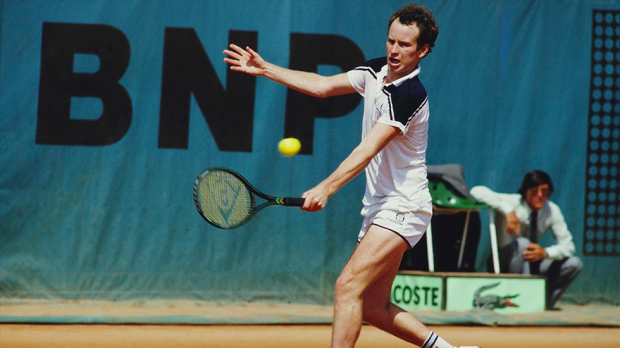
Directed by Julien Faraut
Starring John McEnroe, Ivan Lendl, Mathieu Amalric
John McEnroe: In the Realm of Perfection is and isn’t a movie about John McEnroe. If you are looking for a straight forward biography of the irascible American tennis star this isn’t it. Director Julian Faraut instead delivers a much more intellectual and thought provoking essay involving a mix of sport, documentary, film history and art cinema.
Narrated by Mathieu Amalric (Sink or Swim, Ismael’s Ghosts, Grand Budapest Hotel), the film starts with a focus on the French filmmaker Gil de Kermadec. In the 1970s and 80s he made obsessive studies of tennis players in action, particularly on the iconic red clay courts of Roland-Garros, shooting from the side of the court, or from a ground-level pit at one end, boxed in like a wildlife photographer in a bind. No prey was stalked more assiduously than McEnroe, who didn’t always relish the attention. In one excerpt, he even objects to the boom microphone wielded by de Kermadec’s sound recordist, which he treats as an offensive weapon. “Keep that thing away from me, you understand?” he says. “See this?” he adds, pointing to the far end of his racquet. “In your mouth.”
Faraut trawled through the trove of 16mm footage shot by de Kermadec, much of which had never seen the light of day and discovered there was more of footage of McEnroe than anyone else. Close-ups and slow motion sequences of McEnroe competing, as well as instances of his notorious temper tantrums, highlight a “man who played on the edge of his senses.” The idea of McEnroe the misanthropic genius is banged home a bit heavily, but the raw footage is so captivating this can be forgiven. Faraut isn’t the only one who feels this. It is revealed that Tom Hulce’s portrayal of Mozart as a divinely gifted but impossibly difficult prodigy in Amadeus (1984), was inspired by McEnroe.
John McEnroe: In the Realm of Perfection is quite slow and meandering to start and initially feels like it is going to be a biography of de Kermadec. It does eventually develop into an intriguing investigation of a mercurial tennis legend at the height of his career. It documents McEnroe’s quest for perfection, his frustrations, and most difficult match, against Ivan Lendl at the 1984 French Open.
Far from a traditional documentary, Faraut probes the archival film to unpack both McEnroe’s attention to the sport and the footage itself, creating a lively and immersive look at a driven athlete, a study on the sport of tennis and the human body and movement, and finally how these all intersect with cinema itself.
ANNE PAVY